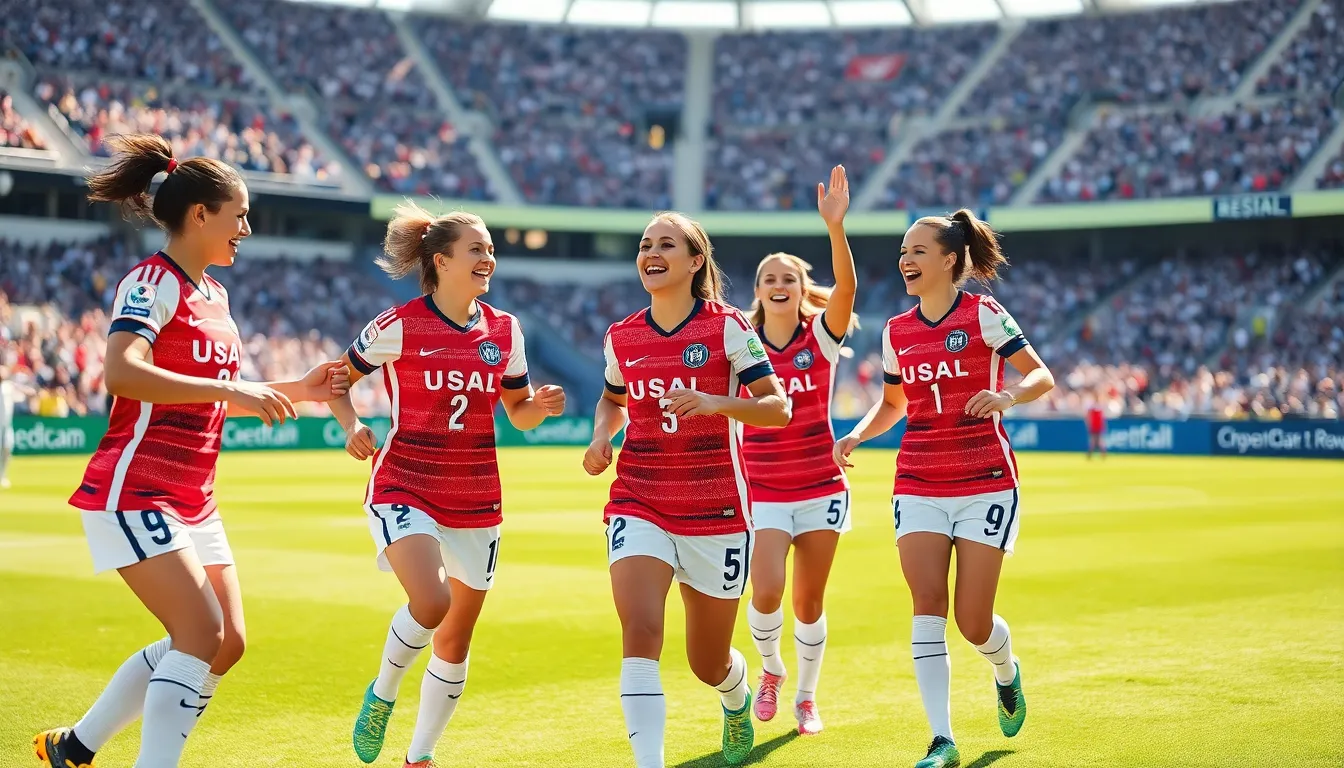Table of Contents
ToggleWhen it comes to soccer, the FIFA Women’s Teams are kicking down barriers and scoring goals like never before. These athletes aren’t just playing for fun; they’re redefining the game and proving that talent knows no gender. With each match, they showcase skill, determination, and a flair for the dramatic that keeps fans on the edge of their seats.
Overview of FIFA Women’s Teams
FIFA Women’s Teams represent a dynamic evolution in global soccer. They showcase the highest level of talent among female athletes. Each national team competes fiercely for dominance on the world stage. Countries invest in their women’s soccer programs, recognizing the value of nurturing female talent.
The growth of women’s soccer aligns with FIFA’s commitment to promoting the sport. The FIFA Women’s World Cup, held every four years, serves as a pinnacle event. In 2023, Australia and New Zealand hosted the tournament, featuring 32 teams, highlighting the expanding reach of women’s soccer.
Competitive leagues around the world contribute significantly to talent development. The National Women’s Soccer League in the U.S. and the Women’s Super League in England attract top players. These leagues provide platforms for athletes to hone their skills and gain visibility.
Representation varies across regions. While countries like the U.S., Germany, and Norway excel, nations in Africa and Asia work to develop stronger programs. Support from local organizations and increased media coverage continues to uplift women’s soccer.
Players, such as Megan Rapinoe and Sam Kerr, inspire future generations. Their stories resonate with young athletes, motivating them to pursue their soccer dreams. Success at the international level boosts the visibility of women’s teams, encouraging sponsorship and investment.
Together, FIFA Women’s Teams not only entertain but also challenge stereotypes. They stand as a testament to perseverance, talent, and the importance of gender equity in sports.
Historical Background

FIFA Women’s Teams have a rich history that reflects their journey through challenges and achievements in soccer.
Development of Women’s Football
Women’s football gained momentum in the late 20th century, with increased recognition of female athletes. Organizations began establishing leagues, leading to greater participation rates. In the 1980s, initiatives launched in Europe and North America set the foundation for growth. Countries started investing in training programs, emphasizing skill development. This investment continues to yield benefits, as more girls engage in the sport across the globe. Additionally, the introduction of schools and youth clubs further encouraged enrollment. Furthermore, greater media exposure has helped elevate the visibility of women’s football.
Key Milestones in FIFA Women’s Competitions
Several pivotal events mark the development of FIFA Women’s competitions. The inaugural FIFA Women’s World Cup took place in 1991 in China, featuring 12 teams. This tournament showcased the talent of female players on an international stage. Subsequent tournaments garnered attention, with the 1999 World Cup held in the U.S. drawing record crowds and media coverage. In 2015, the tournament in Canada attracted a global audience, further boosting interest in women’s soccer. The expansion of the 2023 tournament to 32 teams highlighted the sport’s growing popularity. With each competition, FIFA Women’s Teams continue to break barriers and inspire future generations.
Current Landscape of FIFA Women’s Teams
FIFA Women’s Teams embody a dynamic segment of global soccer, showcasing exceptional talent and skill.
Top Ranked Teams
The United States holds the top position in FIFA rankings, demonstrating consistent excellence through four World Cup titles. Germany follows closely, showcasing a history of strong performances and technical prowess. Canada, known for its disciplined approach, ranks high as well, particularly excelling in international competitions. Sweden has established itself as a powerhouse with a robust squad, frequently competing for top honors. These nations invest significantly in development programs, fostering talent that can compete at the highest levels.
Emerging Teams to Watch
Several teams are rapidly gaining recognition in women’s soccer. Spain demonstrates considerable potential, reflecting growth in domestic leagues and grassroots initiatives. Brazil, while historically strong, is experiencing a resurgence, drawing attention to its young talent pool. Nigeria stands out in Africa, with increasing support for women’s soccer contributing to its competitive spirit. Countries like Australia and Japan continue to enhance their programs, creating exciting narratives as they develop skilled players capable of impacting the global stage.
Notable Players in FIFA Women’s Teams
FIFA Women’s Teams feature remarkable athletes who have left a lasting legacy and influence in the world of soccer. Their achievements inspire countless young players globally.
Impactful Legends
Megan Rapinoe stands out as a transformative figure. She champions social justice while showcasing exceptional skill on the pitch. Birgit Prinz, a German legend, made her mark with two World Cup victories and numerous accolades, influencing future generations. Abby Wambach, known for her powerful headers and leadership, scored over 180 goals for the U.S. national team, cementing her status as one of the greats. Additionally, Hope Solo revolutionized the goalkeeper position, earning recognition with numerous shutouts and accolades during her career.
Rising Stars
The landscape of women’s soccer sees exciting talent emerging. Korroway Williams, a young player from Australia, draws attention for her remarkable speed and scoring ability. Sophia Smith, an American forward, has made waves in the NWSL with her quick play and incredible technique. Meanwhile, Asisat Oshoala from Nigeria demonstrates her skill overseas with FC Barcelona, advancing women’s soccer visibility in Africa. Jess Fleming, a Canadian standout, continues to make headlines with her versatile playing style and determination. Each of these players represents the promising future of women’s soccer, pushing boundaries and inspiring others.
Challenges Facing FIFA Women’s Teams
FIFA Women’s Teams encounter significant challenges that affect their growth and success. Key issues such as gender parity and funding continue to shape the landscape of women’s soccer.
Gender Parity in Sports
Gender parity represents a critical hurdle as female athletes seek equal recognition and support. In many countries, disparities in media coverage persist, limiting visibility for women’s soccer. Female players often face lower salaries compared to their male counterparts, creating financial barriers that impede career longevity. Progress has been made, yet advocates highlight the need for continued efforts to achieve equality. Empowering women in sports requires addressing systemic biases and promoting female representation in leadership roles.
Funding and Resources
Funding and resources play a pivotal role in the development of FIFA Women’s Teams. Limited financial investment often restricts access to training facilities, coaching, and support staff. Countries committed to enhancing their women’s soccer programs recognize the importance of increasing funding to foster talent. The disparity in sponsorship compared to men’s teams has been pronounced, yet growing interest from brands is beginning to change that narrative. Initiatives aimed at boosting funding will help ensure sustainability and success for future generations of female athletes.
FIFA Women’s Teams are not just reshaping the landscape of soccer; they’re inspiring a global movement toward equality and recognition in sports. The dedication and talent of these athletes continue to captivate audiences and challenge stereotypes. As investment in women’s soccer grows and more young players emerge, the future looks bright for this dynamic segment of the sport.
With each tournament and league match, these teams prove that talent knows no gender. The ongoing evolution of women’s soccer reflects a commitment to excellence and the pursuit of equity in athletics. As they break barriers and achieve new milestones, FIFA Women’s Teams are paving the way for future generations to dream big and play hard.




